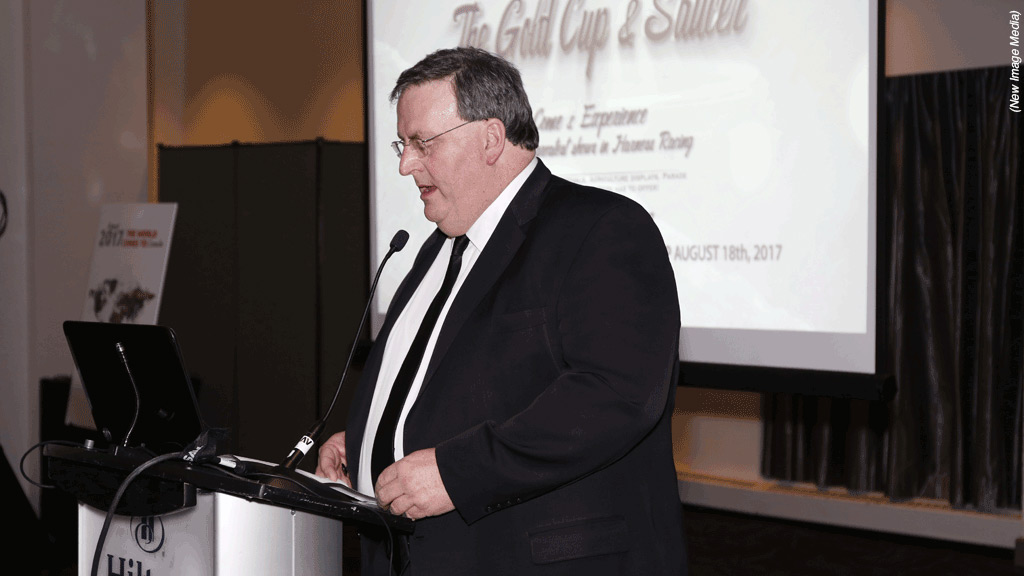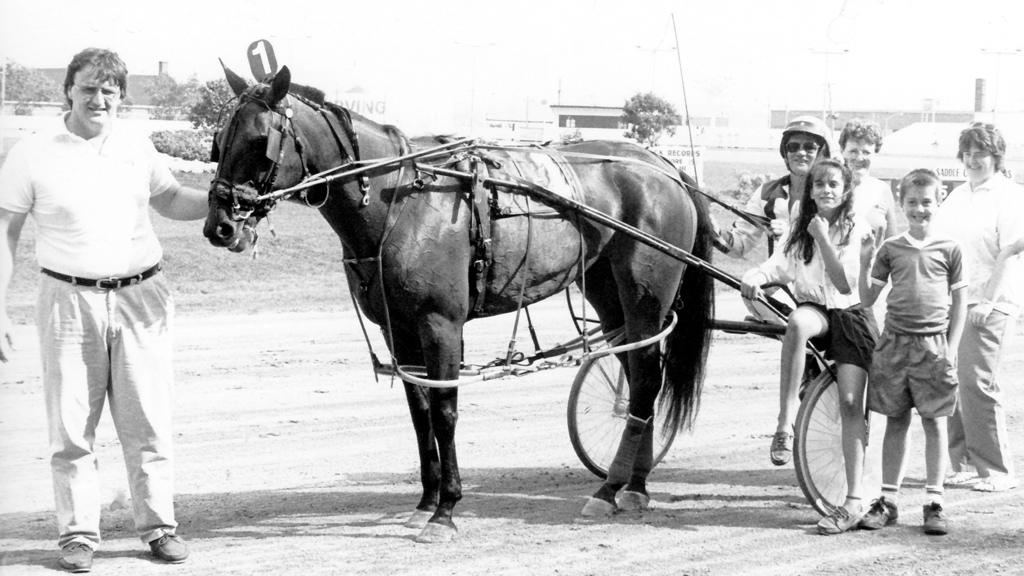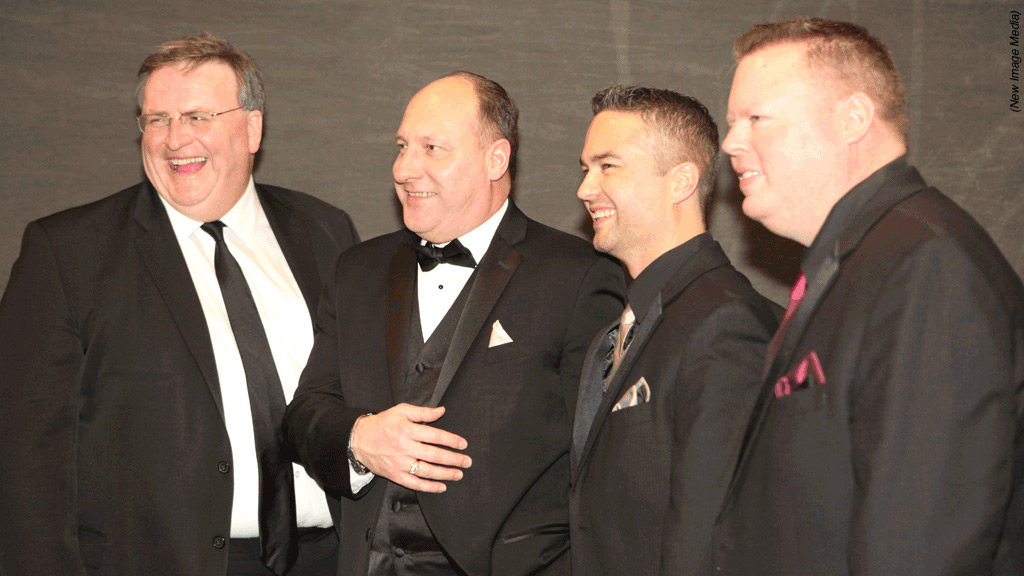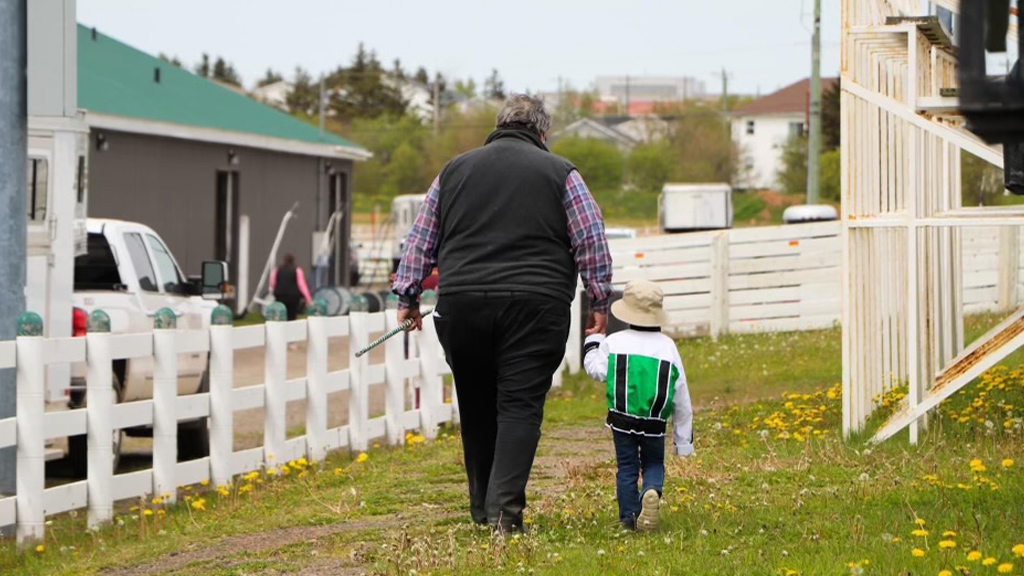A civil servant for more than 35 years with the Prince Edward Island Departments of Agriculture and Finance.
Interim Executive Director of the Maritime Province’s Harness Racing Commission and Interim Racing Manager at Red Shores Charlottetown and Summerside.
Executive Director of Old Home Week and CEO of the PEI Lotteries Commission.
Winner of the 2024 Cam Fella Award and about to be one of the newest inductees into the Canadian Horse Racing Hall Of Fame.
You all know him as Kent Oakes. I just call him Dad. This is his story; at least the best I can tell it. Story by Nicholas Oakes.

Born on June 22, 1960, Dad began his life in the rolling hills of North Wilshire, PEI, the fourth of five children of Charles and Erma Oakes. North Wiltshire is a community of about 150 people, and we always liked to joke that there were more Standardbred horses there than people - there were lots of times that math was dead on too.
Charles, my grandfather, trained and bred some horses in North Wiltshire, notably standing stallion Home Stretch in the inaugural season of the Atlantic Sires Stakes program, in 1967. One of Home Stretch’s offspring, Marion Stretch, was an upper end trotter on PEI in those days, trotting around 2:12, and was trained by Joe Hennessey at the Charlottetown Driving Park. She was nothing flashy and nothing special, but she does hold the distinction of being the first trotter multiple Hall Of Famer, and 11,931 time winner, Wally Hennessey ever drove in a race. She definitely wasn’t Moni Maker, but she kindled a friendship between my father and Wally that lasted his whole life. Wally has called me a few times since Dad passed, for no real reason - just to chat. Just to make sure I’m doing ok. Just to make sure I realized the impact Dad had on the entire harness racing industry.
That right there is why Dad did everything he did. For the people. There may be some less than savory individuals in this business, but there are also the very best people you will ever meet anywhere. Couple that with the greatest animal put on God’s Green Earth, the Standardbred horse, and you have a recipe for a lifelong passion, as well as an ability to see the clear through the fog, no matter what is thrown at you.
Dad’s story began quietly, and that’s the way he liked it. His Uncle George and Aunt, Pat Oakes, ran a stable in Monticello, New York, and also operated a bar and restaurant in the town. Dad would head down there during the summer breaks in high school to spend his days cleaning stalls, harnessing and jogging horses, and learning how to tell some dandy backstretch stories.
While in Monticello, in his teens, Dad met some of his best lifelong friends - fellow Islander Mike Campbell and his wife Joan. They were campaigning a string of New York-breds at the time, before returning back to Joan’s hometown of Fredericton, New Brunswick.
It was in Monticello that he laid eyes on Niatross, who was stabled at the track in the Catskills in the middle of his exceptional career. Seeing a horse like that stuck with Dad his whole life, and I really think it gave him some inspiration as to what this sport could be. So Dad came home, back to the red soil of PEI, with more than calloused hands and lifelong memories - he came home with a vision. That vision never left him.
In true PEI fashion, Dad also came home to marry a potato farmer’s daughter, Janet Sanderson, and they had two sons, my brother Jeremy and I. Jeremy never took a great interest in the business however. The last time I remember him handling a horse was when he walked Sakra Posey out to the field at Lowell Balderston’s Farm, when she was in-foal with Igoddago. That son of Drop Off is 27-years-old this year, so you do the math on that. But Jeremy did tune in to Dad’s love of public service - he works with the Provincial Emergency Management Organization and resides in Summerside with his wife Rebecca and two children, Charlea and Leo.
December of 1988 is when Dad got his first job with the Provincial Department of Agriculture, and he also served as Executive Director of PEI’s Provincial Exhibition, Old Home Week, for a period in the 1990s.
In time, Dad found a home, not only at the track, but within the system that governed it. He had a number of responsibilities with the Department of Agriculture, but it was the mid-’90s when he got keyed into his true calling, when he helped negotiate an end to the horsepeople’s strike at the Charlottetown Driving Park. That moment transitioned into a more full-time role in harness racing with the Province, looking after the industry on PEI under the Pat Binns Conservative Government.
It was during that time in government, in 2000, that a moment came when two individuals met, not realizing they were about to reshape Canadian Harness Racing for generations to come.

Mitch Murphy, who would go on to become the 2003 Cam Fella Award winner, was named Minister of Agriculture in a cabinet shuffle. As was normal procedure, the bureaucrats responsible for each file would come in and brief the new minister, a process that usually took 15 to 30 minutes each. When it was time to be briefed on harness racing, Dad walked into Murphy’s office with a binder full of papers that made a thud when it dropped on his desk. Dad proceeded to forego the normal 20 minute policy brief, and take an hour-and-a-half explaining the importance of harness racing in the Province of PEI, and the potential of what it could become. Murphy actually told that story at Dad’s funeral, and noted that not once did Dad open his binder to look anything up. It was all in his head. That fact Murphy was a pallbearer at Dad’s funeral in June of 2024, gives a pretty clear picture of how well they got along for the next 24 years.
During those years, Dad served on a number of committees that reshaped the Regional Harness Racing Industry. One committee joined the New Brunswick, Nova Scotia and PEI racing commissions into the Maritime Province’s Harness Racing Commission, where he served as Executive Director for a nine-month term.
Another committee regrouped the Atlantic Sires Stakes finals, held at different tracks, into a single Atlantic Breeder’s Crown Weekend Of Champions.
Another took all the industry groups on PEI, and put them onto a singular board, with the creation of the PEI Harness Racing Industry Association (PEIHRIA). A singular voice for the industry.
One of the biggest reasons we have been able to stabilize government support for the industry, and keep everyone rowing in the same direction is the volunteer board of the PEIHRIA, that meets every month to craft policy and keep a cohesive message for the future.
Dad always said volunteers are the life blood of the industry. The commitment everyday people put in to make the industry better, in every way, was something that always filled him with pride.
Myself, I would go on to serve as Chair, Vice-Chair and Secretary on some industry committees, and those board meetings saw Dad at every one of them. The same as he was for decades - spending his evenings at board meetings, representing the Government of Prince Edward Island on his own time. He was usually sitting there quietly, taking in the proceedings, but when he did say something it was always calm, well thought-out, and carried weight in the room.
I’ll never forget one time, when I was in a slump about some disagreements at a recent board meeting - Dad reminded me that this industry is bigger than any of the people populating it. He said, “It’s all about racing. This business is here for everyone, Nick. Don’t lose sight of that, even when someone tries to bend policy for personal gain.”
Dad’s quiet confidence may never have been needed more than in September, 2003 - a seminal moment in Atlantic Canadian racing.
Hurricane Juan came crashing into PEI, causing a swath of destruction through the province and ripping the roof off the old Charlottetown Driving Park grandstand. The track was already struggling financially, and whether it would survive and continue to run was up in the air. But there was an appetite in government to do something - what to do was the question. Mitch Murphy remembers Dad walking into his office, laying out the blueprints for the under-construction Grand River Raceway, and saying, “This is what we need to do here.”
Murphy’s words: “When everyone else was wondering, Kent was planning.”
The new grandstand opened in the Summer of 2005, with expanded gaming, and has morphed into what we now know as Red Shores Charlottetown.
The important thing to remember in all of this is that, yes, Dad had a huge part to play in these events, but he did not do it alone. He was a team player and never - I mean never - did he say, “I did this. I did that.” It was always “We.”
He had the utmost respect for all the people who aided in guiding the ship. He was a civil servant. His responsibility was to the tax payers of Prince Edward Island, but he knew how important harness racing was to the economy, and he knew it could be even more so. He didn’t create PEI racing by any means. The Gold Cup & Saucer, the world class horsepeople, and an incredible fan base were here long before him. But he made it his mission to preserve and expand the legacy that was laid down before him.
He spoke often and fondly of the people who made a real difference in the business, in both volunteer and executive roles across the region, with little fanfare. Some people you may have heard of. Some not.
Eric Johnston, Bob Bowness, Wally Wood, Blair Campbell, Scott MacPhail, Blaine MacPherson, Gary Poulton, Norman Hall, John Clarey, Doug Roloson, Lynda Ramsay, Jack Ferguson, Doug Harkness, Raymond White, Wayne Pike, Eldon Jamieson, John Eldon Green, Earl Smith, Cyril Reddy, Jeff Malloy, Howie Trainor, Tom Clark, Clare MacDonald, Mike O’Brien, Brian Andrew, Bert Honkoop and probably 250 other people that I’ll apologize for not naming, as I’d run out of room trying to list them all. But if one of you is reading this, you know who you are.
If you loved harness racing, he loved you. Disagree with him or not, he didn’t care. As long as you wanted what you thought was best for the industry, he always respected you. That is something he always stressed to me: Just because they don’t always see the big picture, doesn’t mean they’re wrong or their opinion is unimportant. What makes this business great is our unity, our common cause, our love of the animal and the people that care for them every day.
Dad said, in a TROT Magazine story 25 years ago, that “Harness racing is a business with all kinds of history and not enough of a future. Our goal is to change that.”
Well he certainly did that on PEI.
His relationship the last few years with PEIHRIA Executive Director Julie Jamieson and Red Shores Racing Manager Lee Drake was really something to cherish. They worked together every single day, helping make the industry a better place.

Drake has said to me recently, how much he misses Dad every waking moment, and how he wishes Dad was there to give him advice or background on any kind of issue in the industry.
Julie Jamieson put it best when she said, “Kent had his hand in everything, but you really didn’t know he did. I knew because I worked with him every day, but most of the industry had no idea of the things he did. If they had, they’d realize just how much we miss him right now.”
After the new facility was built in Charlottetown, in 2005, harness racing continued to pace forward on PEI, with a new racing surface at the Summerside Raceway, as well as a new grandstand and barns, championed by Federal MP Gail Shea. Our stakes program grew, our breed improved, and we entered the simulcast market across the world. When other jurisdictions faltered, we exceeded. We continue to grow to this day, and Dad did more than his part, collaborating with his “We” attitude.
Provincial Finance Minister Wes Sheridan, from the Robert Ghiz Liberal Government, said to me after Dad’s passing, that there wasn’t a single policy piece on harness racing that Dad didn’t have his fingers in or personally craft. But when it came time to take credit, Dad was nowhere to be found.
I know that he would be profoundly proud of the honour of the Cam Fella Award, the lifetime achievement award from the Atlantic Sires Stakes, the Joe Smallwood Memorial Award from former PEI Premier Dennis King, and his upcoming induction to the Canadian Horse Racing Hall Of Fame. But he would also be just a bit embarrassed. He just wasn’t a spotlight guy.
He loved the business. He loved the phone calls with Darren Crowe, Jim Whelan and Art Kennedy; the lunchtime chats with Peter MacPhee. He loved talking classification with longtime PEI Race Secretary Gerard Smith. The little things. The things where you could get things done without fanfare.
Another true love of his was breeding horses. His Uncle George gifted him and his older brother, Wayne, a BGs Bunny mare named Give Mea Call, who would go on to produce 1997 Atlantic Sires Stakes Champion filly Miss Lori [$97,452], campaigned by Albert Bernard.
But it was a deal made with his dear friend Mike Campbell that gave him his greatest moment raising horses, with the birth of Igoddago [$212,298], the winner of the 2004 Governor’s Plate, when he tied the track record of 1:55.3 over the old Summerside Raceway. The next season gave another story Dad loved telling, as Igoddago breezed over the newly constructed track at the Charlottetown Driving Park in 1:54 flat, the fastest mile ever, at that time, by an Atlantic-bred in the region.
From the outside, he was a civil servant, but within the industry, he was a champion - one who understood both the needs of the horsepeople and the complexities of public management. Dad understood that for the sport to survive, it had to evolve, but never at the expense of its heart.
His advocacy for the PEI Matinee Racing Program was particularly passionate. He was instrumental in helping sustain PEI’s matinee tracks, such as Kensington, Alberton, and Pinette - modest in appearance, but essential in purpose. These tracks don’t host stakes races or live betting, but what they do host is future champions - both equine and human.
Dad’s influence expanded nationally when he was elected to the Board of Standardbred Canada in 2010. By 2014, he had become its Chairman, and he believed that what happened at tracks like Truro, Inverness, and Charlottetown mattered just as much as what happened at Mohawk or Woodbine. He brought a strong Maritime voice to the national table and ensured it was heard.
He wanted to do important work without needing to be seen doing it, and quietly ensured that the Island’s racing identity remained intact through decades of change.
Dad believed that racing wasn’t just about horses. It was about people, communities, and continuity. It was about little kids standing at the rail on a summer evening, dreaming of driving one day. It was about generations working together in the same barn. It was about pride, not ego - the kind of pride rooted in hard work and home soil. Racing wasn’t just a spectacle for gamblers; it was a way of life for thousands.
This understanding shaped the way he led - not from above, but from among. At meetings, he listened more than he spoke. When tempers flared Dad remained calm, choosing diplomacy over dominance. He could quote statistics and economic impact reports from memory, but he also could recite the names of every groom as easily as he could hall of fame trainers and drivers. He didn’t want to manage the sport, he was simply part of it.
Dad always championed sustainable gaming revenue models, argued for racing’s social and cultural value at the legislative level, and sought to integrate live racing with new forms of entertainment. His strategic vision was a balancing act honouring the past while preparing for the future. He was always clear with me that if harness racing didn’t integrate with sports gaming, nothing else we do would matter.
He often pointed to the Atlantic Sires Stakes program as a model of regional cooperation and commitment to grassroots breeding. It wasn’t just about fast horses - it was about preserving the cycle of local foals, trained by local horsepeople, cheered on by local fans. Dad believed in that cycle because he had lived it. He knew that in every Island barn was a story worth telling.
He went out of his way to help the other provinces in the region whenever he could too. He took the time to speak with, and travel to meet, bureaucrats and decision makers in Nova Scotia, New Brunswick, and Newfoundland and Labrador, to try to further the industry’s reach. He was reachable at all times. I couldn’t tell you how many times he’d step away to take a phone call about the industry, whether it was 10 pm or on a weekend. It wasn’t work to him, it was a life worth living.
He was different from many in this business as well, in that he didn’t find his glory on the track. Seeing the success of others, and the fact there was an industry there for them to compete and raise their families in, was everything to him.
The first-time driver on a matinee Sunday, the foal’s first steps at breeding farms across the region, a first time bettor laying down a toonie - that is what mattered to him.
But don’t kid yourself, he could also hang up a horse pretty good from standing at the fence. There were very few times I trained a colt at the Charlottetown Driving Park, where my phone didn’t ding after with a text that said something like, ‘You think that Pang Shui filly could use some more hopple?’
Dad believed the sport’s heart beat strongest when it was rooted in community, continuity, and care. And in a world that can forget its builders, I hope that Prince Edward Island will never forget him. He knew how important this Industry is, but he also knew it could be so much more than it is. He knew that working together could bring us to new heights, no matter where you are. And he knew that to get anything of substance done, you couldn’t try and do it alone.
You never think a moment is your last, and that’s why recalling the last time I ever spoke face-to-face with my Dad hits me so hard. It was a conversation I can’t get out of my head. He stopped by my farm in Warren Grove, PEI, where I train a string of horses. We sat around, told stories and talked. He went to leave, and was standing with his hand on the car door. We were talking about yearling sales, when I mentioned I had never been to Harrisburg and would like to go. He said “We’re going this year then. Me and you.”
That was a Wednesday night. He jumped in his car and left, and I didn’t think much of it.
Thursday I spoke with him on the phone but never saw him.
Friday, he lost his life in a car accident while on his way to my house to help me race a couple colts in Nova Scotia. He was 64.
The shock rippled through the racing world. I always knew Dad was respected in the business, but the people that came out of the woodwork and the response from the business completed me and my family.
One of the things that stuck with me was how we planned to go to Harrisburg - so I was absolutely set on going last November. And I did.
Since Dad’s passing, I’ve spent a lot of time listening to ‘Song For Dad’ by Keith Urban. One of the lines is: “When someone says I hope I get to meet your dad, I just smile and say ‘You already have.’”
When I went to Harrisburg I bought a Cattlewash filly. Something about seeing her just made me think that she was exactly the kind of horse he would tell me to try.
I renamed her: You Already Have.

I want to be able to say, “If you meet me, you have met him.” I know I’ll try to measure up to everything my father did in his life. I know I’ll fall short.
But I want to embody the same essence he did. The love of the industry and the animal. Jeremy has Dad’s love of public service, and some of his seriously dry humor. I want to be to my son, Noah, the same stabilizing force Dad was for me.
When someone meets me or talks to me, I want it to subconsciously hit them that half of me came from my father; that he was one of the greats in the business, in Atlantic Canada, and that Nicholas Oakes wants the same things his father did:
Stability. Future. Sustainability.
Dad has always been a Hall Of Famer to me. Now he’s going to be one to everyone else too.
This feature originally appeared in the June issue of TROT Magazine. Subscribe to TROT today by clicking the banner below.


